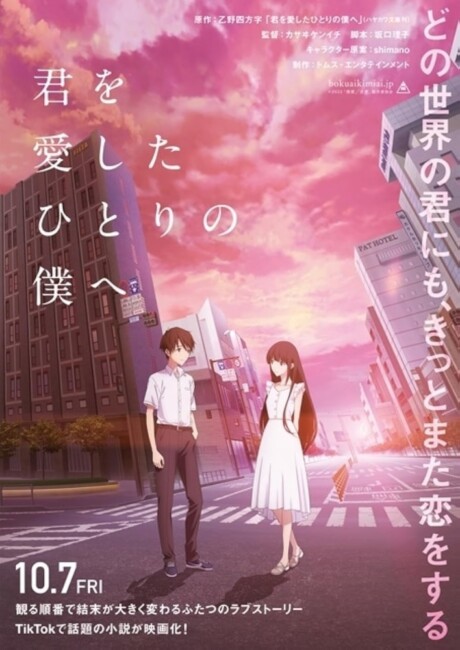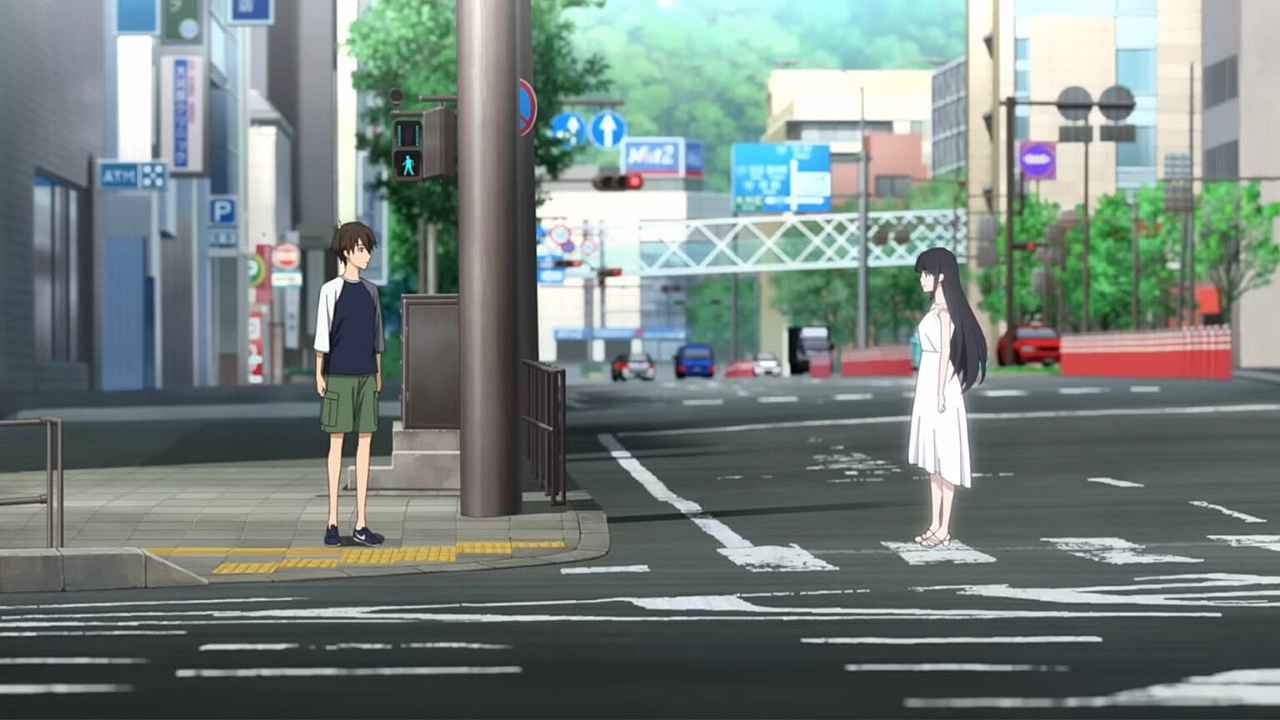aka To Me, The One Who Loved You
(Kimi o Aishita Hitori no Boku e)
Crew
Director – Kenichi Kasai, Screenplay – Yomiji Otono & Riko Sakaguchi. Production Company – Dentsu/TMS Entertainment.

The Science Fiction Horror and Fantasy Film Review

Director – Kenichi Kasai, Screenplay – Yomiji Otono & Riko Sakaguchi. Production Company – Dentsu/TMS Entertainment.
Following the divorce of his parents, young Koyomi Takasaki goes to live with his father as he takes a job at the Imaginary Science Institute. At the institute, Koyomi meets Shiro Sato, the daughter of one of the other scientists. She introduces him to the IP machine with which one is able to enter a capsule that takes them to a different world of the multiverse. Koyomi is upset after the death of his grandfather’s beloved dog Yuno. Shiro encourages him to dream of a world where Yuno is alive – Koyomi does, only to find that it is a world in which his grandfather is now dead. He and Shiro grow up together where she believes that they will get married one day. However, Koyomo’s father and Shiro’s mother then announce that they are going to marry. This is of great upset to Koyomi and Shiro, who realise they can no longer marry if they are going to be siblings. They decide the solution to this is to enter the IP machine together and find a world where their parents did not divorce. However, while in this world, Shiro is abruptly hit and killed by a car at a street crossing. Koyomi returns to his body but this leaves Shiro as a disembodied soul, a ghost seen at the crossing, unable to reconnect to her body.
Multiverse themes have overrun popular cinema in recent years in particular with assorted superhero offerings such as Spider-Man: Into the Spider-Verse (2018) and sequels, Spider-Man: No Way Home (2021), Doctor Strange in the Multiverse of Madness (2022) and The Flash (2023). The major complaint that one could make is that these fail to offer any kind of rigorous treatment of the ideas – all they are are adventures where we encounter different versions of familiar characters. There are however a great many more sophisticated treatments out there beyond the superhero genre – see films such as Coherence (2013), Parallel (2024) and the hit of Everything Everywhere All at Once (2022). (I have a detailed listing of these at Alternate Timelines and Multiverses).
To the Solitary Me Who Loved You is a companion piece to To Every You I’ve Loved Before (2022), which deals with alternate versions of the lead character Koyomi and Kazune, the woman Koyomi marries later in this film. Both films were released on the same date. Director Kenichi Kasai has been working as a storyboard artist graduating to director of Japanese tv anime since the late 1990s. To the Solitary Me Who Loved You was his feature film debut.
In contrast to the assorted MCU multiverse film, To the Solitary Me Who Loved You is a beautiful and sophisticated treatment of alternate timeline themes. (And manages to juggle a sophisticated examination of its ideas, even when you are reading them through often poor subtitles). It is a film that is even gives us discussions on what multiverse theory and the Mandela Effect are within the first few minutes. The story develops out with considerable cleverness. The initial scenes where the characters flip between alternate timelines is average as this goes, but then comes the heart-breaking twist where Shiro is stranded between worlds, existing as a ghost that can sometimes be seen by people at the city intersection where she was hit.

The second half of the story where we see Koyomi grow up, meet Kazuno Hidaka (the principal character from To Every You I’ve Loved Before), they become co-workers and collaborators, marry and see them go into old age, all before we learn he has been harbouring a plan to go back and save Shiro’s ghost, contains some great writing. All before a saddening end, not unlike the one in The Butterfly Effect (2004), where Koyomi realises that the only way to save Shiro is remove himself from her timeline, before an ending on a slightly upbeat note.
On the minus side, the quality of animation is strictly average. Characters are often limited within their frame of movement. It is also noticeable that Kenichi Kasai draws on an older style of anime where character have giant over-sized eyes that take up half their faces. However, in its simplicity, To the Solitary Me Who Loved You finds a lovely tenderness, especially in the scenes where the two children run away together on their bicycles and go on an adventure because their parents marrying mean they will never be able to, and then their return home with Shiro wistfully wishing that she could grow up so that she didn’t have to get scolded when she came home late.
Trailer here
